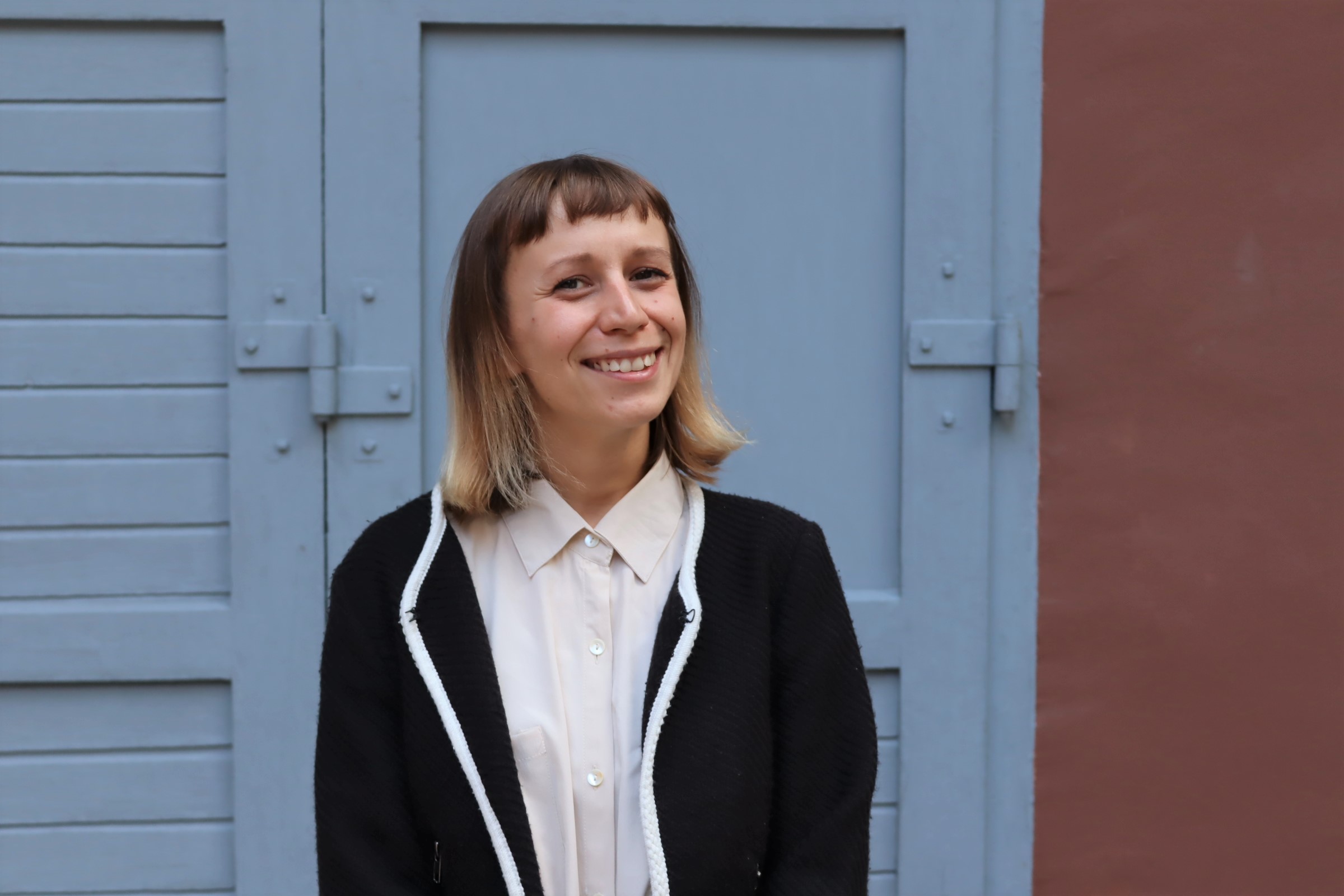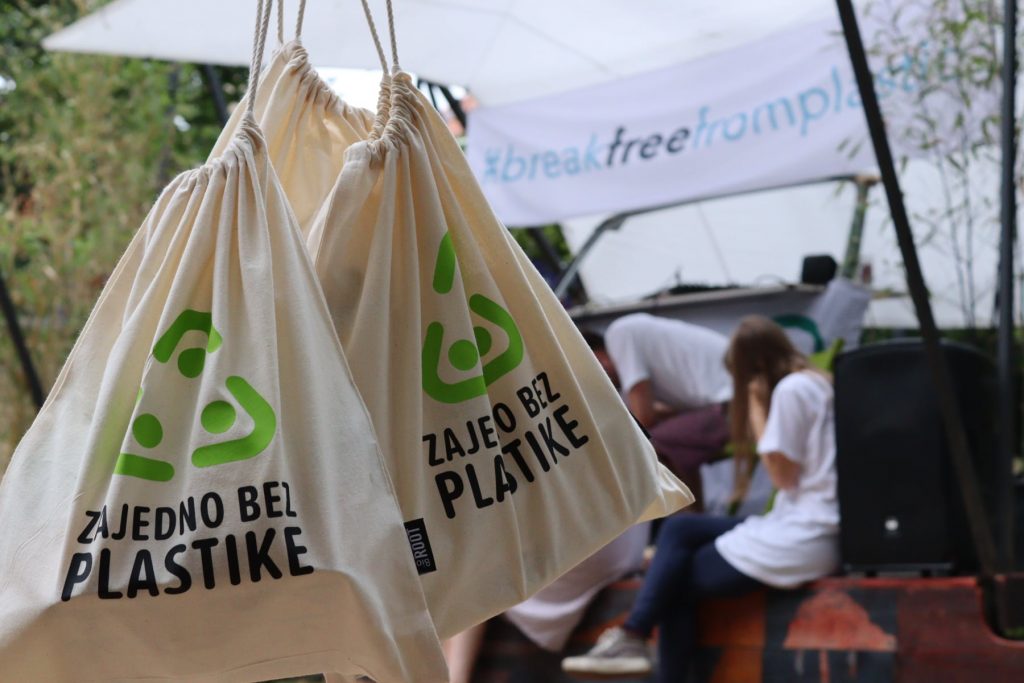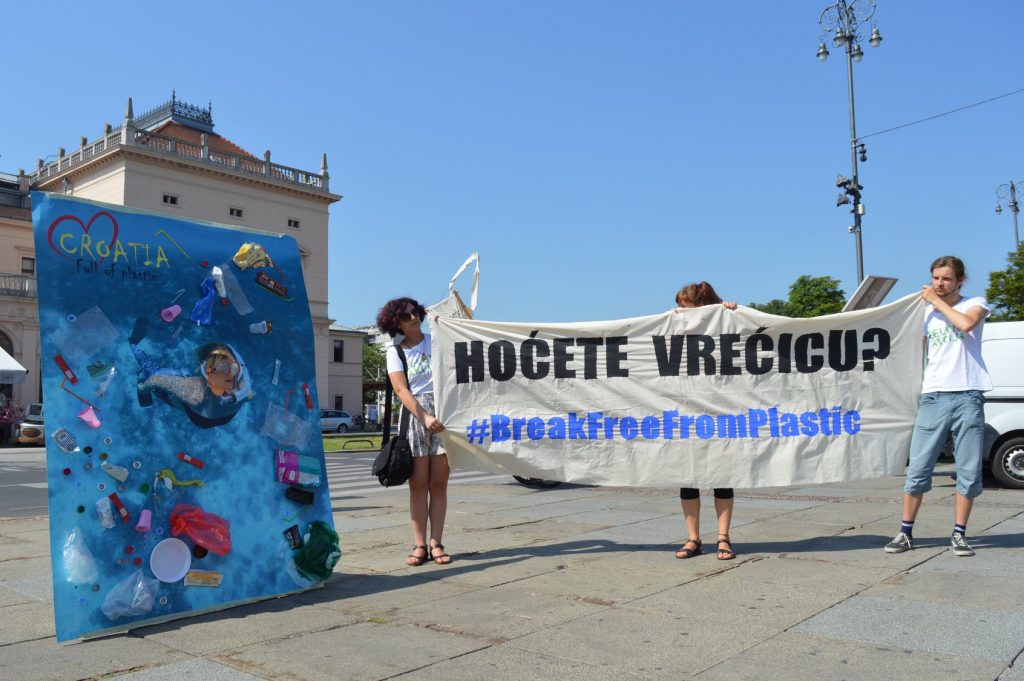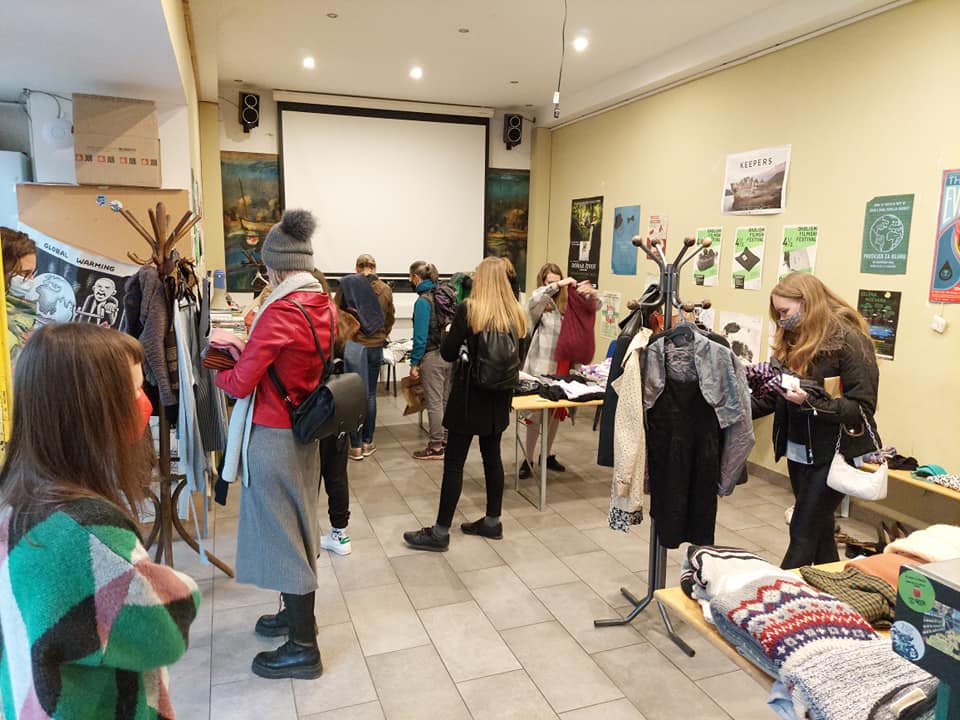Since my topic is “Volunteering”, I was really curious to see what kind of NGOs there are in Zagreb and how people can get involved in volunteering here. At a birthday party, I met Ana – Marija Mileusnić from Zelena Akcija, which is an environmental activism NGO. I am very interested in the topic of environmental activism and we can state that the climate crisis concerns all of us and has so many layers to it. It is great that there are organizations like Zelena Akcija, that raise awareness about the topic, educate and speak with decision makers, because we must act now. I met with Ana again, to get to know more about her work for Zelena Akcija and in the following you can read my interview with her. 😊
Q: Hello! Could you quickly present yourself and what you’re doing with Zelena Akcija?
A: Hey, my name is Ana and I am an activist and also an employee of Zelena Akcija (ZA), “Friends of the Earth Croatia”, and I work there on the program of waste management. The topic that I am dealing with within the waste management program is single use plastics, prevention, and reuse. But I am also part of the educational Team of ZA where we are using popular education tools to support activism in general, but also specifically environmental and climate activism by using an intersectional approach.
Q: How long have you been working with Zelena Akcija?
A. “I’ve been involved since 2016. I have been employed since 2018. Before I was volunteering with ZA and part of the activist group and the organizing team of the environmental film festival. And even though I am now employed, I still volunteer within the activist groups.
Q: How did you first get to ZA?
A: I was involved with a different organization and I was working on this project called “Little Green Festival”. I started organizing this in 2014 and then I needed some new ideas for the program. I saw that Zelena Akcija was offering a training called “School and sustainability”, which was a summer camp. I applied to see what else I can offer and where to focus on the organization of the festival in my hometown. Then, since I finished the program and returned to Zagreb, I was really thrilled to see the group of people within the NGO again. That’s why I was keen on joining the group and how I got involved. Since then, I kind of worked within the activist group. I was part of helping out the educational team in the development of some workshops. Mostly my topic of interest was sustainable activism.
Maybe it’s also important to mention that my background of interest was in women studies and peace studies. That’s why I really liked Zelena Akcija’s approach because it’s based on combining the approach of economic and social and climate justice. I could see a lot of space for a feminist approach within environmentalism. So, I was very active, and I showed initiative, I organized discussions etc. What really pushed me was the engagement in the “Young Friends of the Earth Europe’‘ network. Youth of Zelena Akcija is part of that. It’s a European network of young activists. We are connected through our shared values and approach. That was where we learned some campaigning skills and discussed more deeply some thematics. Later, we could return the knowledge that we got there to our groups.
Q: How does a typical day look for you if that’s even possible to describe?
A: Haha, that’s funny because whenever people ask, “what do you do” I can just say “everything”. It’s difficult to say, but the main parts would be advocacy campaigns.
Advocacy campaigns
This consists of following and monitoring policies and whatever is going on on the level of my topic which currently is single use plastic. So, I’m working on this transposition of the single use plastic directive into national legislation. At one point we organized a meeting with various stakeholders including ministry and the industry, other NGOs and so on. After that we were invited to become part of this transposition committee as NGO representatives. So it is following what is going on, sending recommendations and stuff like this.
We are also part of a network called “Zero Waste Europe” and “Break free From Plastic”. These are networks from NGOs mostly from Europe but also global parts. That’s where most of the knowledge and our advocacy positions come from. We are shaping the narrative together and supporting each other with tools and knowledge. We are also involved in campaigns together. Basically, all the national work we’re doing, we’re reporting to the network. And then we also hear reports from others regarding what is going on in Europe. That is how we have this insight and sort of base for our advocacy work. So, we are familiar with situations and state of policies in different parts of Europe.
I also took on a new role which is co-leading the task force within “Break free from plastic” and I am a co-lead on the menstrual taskforce. It’s a specific topic and we’re advocating for reusable menstrual items to be available for all menstruators. We’re connecting the topic of period poverty and access to menstrual items, menstrual hygiene, and the whole infrastructure. Also, it is about menstruation as a tabu and trying to break the pattern with using this intersectional approach. With other NGOs, we exchange what is going on everywhere and then we have some skill exchange workshops on how to deal with the topic.
Then sometimes we plan joint statements or joint actions. If there is something urgent, we have these street actions and performances to draw attention from the media. That’s also what ZA is famous for. That means, we must plan what message we want to send and also what performance we want to do. We invite the media and later we send the press release together with photos. Also, we give media statements to the journalists that come.
Q: What kind of events are organized by ZA?
A: We organize different kinds of events for the public. Mostly they are educational, sometimes they are just proper action. For example, last year, we started to organize swap parties to promote circular communities and reuse in general which got a lot of media attention. Our aim is not only to organize swap parties, but also to inspire others to organize these kinds of events.
The Green telephone
A: There is a specific program within ZA which is called the “Green telephone”. The people behind it are all the time at disposal to citizens. People can call when they see something related to the environment. It’s like a bridge between the wider public and institutions. Because people can recognize a certain problem, but maybe don’t know how to write a request to solve this or put it in the process in the legal procedure. Then, partly people are educated on how to solve something themselves. Or the colleagues from the Green Telephone are handling it.
Another example of the consulting work we’re doing could be the Zagreb Film Festival. They wanted to make their festival more sustainable. So they invited us and asked, what can you recommend, how can we organize waste management for example?
Biciklopopravljaona aka Bicpop
A: What we are super proud of as an organization is this bike kitchen, Bicpop. It is a bicycle repair kitchen. It’s a combination of reuse and inclusion. There are volunteers that meet once per week. They get broken bicycle donations, then they mend them and donate them to the ones in need.
The second part of Bicpop is with a wider public. Every Thursday, anyone can come with their own bike. The volunteers from the bike kitchen are not mending the bikes but rather supporting and explaining how people can do it on their own.
Activism
A: We also have activist trainings. Each year we have this educational program which is called “Autumn Eco Seminar”. The work of ZA is presented, topic by topic. It always ends with a weekend workshop which is kind of our recruiting moment for anyone who would want to join ZA as an activist.
Q: How can one contribute to the work of ZA?
A: We have weekly meetings. In these meetings, we either plan actions and campaigns or we discuss something. And if we have an action in the respective week for example, then we paint banners, and practice for the performance. And then there is also the moment when we actually do it. You can basically be involved in each of the steps. Either, you can come to the meetings and help brainstorm, or you can just come to paint banners. You can apply for the activist group and follow the mailing list and see, in which parts you want to participate.
Thank you Ana for your time and for answering these questions!
For my part I can say that I was really inspired by the interview with Ana and I feel motivated now, to participate in some actions myself. If it’s similar for you and you want to know more about Zelena Akcija, their upcoming events or subscribe to the activist group, here you can find their website and Facebook.
See you next month!
Katrina 😊




